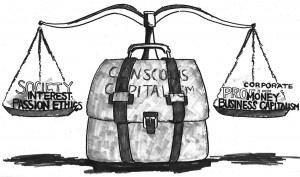Conscious capitalism should be the future
Every time you turn on your TV, it appears as if another corporate villain is being put away in the big house for fraud, extortion or perjury. Bear Stearns. Refco. AIG: All of these business’ honchos are still feeling the wrath of the law and the public. With the Occupy Wall Street protests dominating the streets of New York and our media for most of the summer, the public’s distrust and hate of the business world is palpable. 
So two kinds of reactions exist when people learn of your summer internship at an investment banking firm or consulting company. Members of the first group, well-versed in the Forbes 500 and largely composed of business students as well, are impressed and envious. The other group will congratulate you, possibly fake a smile and internally label you a corporate sell-out.
In our society, the career options of finance or investment banking have become synonymous with cash-hungry and profit-driven. There is nothing noble about a career in a corporate setting, people assume. According to many, if you’ve chosen business as a career option, you have essentially sold your soul to your briefcase.
The truth is, at least some of that perception is accurate. It’s no secret that the business world is tough and unrelenting. The competition is intense and ultimately, your worth in a business setting boils down to one thing: Are you making your company money? Far more important than your passions, convictions and interests, do your abilities factor favorably into the bottom line? Are you a good investment? Are you profitable?
Despite this, business majors with a conscience have good reason to be hopeful. According to Whole Foods Market co-founder John Mackey, the tide has begun to turn. “Conscious capitalism,” a term coined by Mackey in his new book Conscious Capitalism: Liberating the Heroic Spirit of Business, is rapidly becoming a new corporate norm. Mackey argues that business, like any field, can have a positive impact as long as businesses are conscious of their actions and maintain a “shared value” to society. In his book, Mackey ambitiously states that “business is good because it creates value, it is ethical because it is based on voluntary exchange, it is noble because it can elevate our existence, and it is heroic because it lifts people out of poverty and creates prosperity.” To support his argument, he lists popular and successful companies such as Google, Amazon, Trader Joe’s and Costco, which maintain scandal-free business practices and a solid customer base.
It is possible, at least according to Mackey, to be both capitalistic and virtuous. “Free-enterprise capitalism is the most powerful system for social cooperation and human progress ever conceived,” he writes.
Studies reveal that Mackey has a valid point. Companies with histories of corruption, environmental degradation or dishonesty are historically more likely to face enormous financial repercussions, which hinder or even destroy business. “The most amazing business models are those where profit and social impact live in harmony. Business models can be designed where impact doesn’t diminish revenues or profit and vice versa,” financial analyst Alex Osterwalder wrote in the Harvard Business Review.
If adopted successfully, that kind of mentality could entail a shift in public opinion about corporations. Recent movements such as Occupy Wall Street indicate that the American public is fed up with an industry that appears to exploit people for profit. In 2008, First Lady Michelle Obama famously said at a conference for women, “Don’t go into corporate America. Become teachers. Work for the community … Make that choice, as we did, to move out of the money-making industry into the helping industry.” The diminished trust in business leaders has encouraged politicians and policy makers to consider tax increases and corporate limitations. The more corporate scandals surface, the less likely it that corporations will ever regain legitimacy in the eyes of the American people.
Conscious capitalism could change that trend. It’s time we stop treating profits and purpose as two separate entities in the business setting, and USC graduates can and should start initiating that change. Business is a vehicle for social change and progress and if more businesses maintain a commitment to a positive shared value for society, all parties involved will benefit. In the words of Mackey, “Capitalism is one of the most compelling ideas we humans have ever had. But we can aspire to something even greater.”
It’s time for businesses to adjust their aspirations, retire questions like “Are you making money?” and start asking questions like, “Are you creating value?” If they are able to do this, there might be a day in the near future when a corporate career is perceived to be as beneficial for society as any other career, briefcase and all.
Payal Mukerji is a junior majoring in business administration. Her column “Risky Business” runs Tuesdays.
